by Jenny Rose | Mar 9, 2017 | A Flourishing Woman, Body, Food
This is a third post in a series in which I’ve questioned the relationship between American dietary standards and health and written about my own personal journey with diet. This week I’ll focus on some of the ideology embedded in diet and food production.
In my first post, I briefly mentioned vegan bullying. Because of the way we choose to eat, my partner and I spend some time in digital conversations about food. I’ve been amazed by the hostility and hatefulness directed towards people who choose to produce, harvest and/or eat meat.
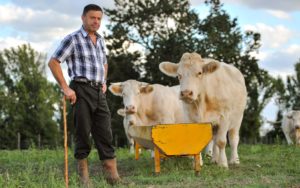
Photo by Agence Producteurs Locaux Damien Kühn on Unsplash
All people need to eat in order to live. That’s a given. I believe most individuals want to be able to feed themselves and their families with high-quality, healthy food. Sadly, because we live in a capitalist and consumer culture, this basic need is hugely impacted by financial, political, social and geographical variables. Additionally, diet is inextricably entwined in the religious and spiritual framework of many people.
Just this short list of factors make the basic necessity of putting food in our mouths complicated. Obesity and other eating disorders, as well as food-related diseases and health issues (which may be to say all diseases and health issues) reflect that.
Add to that a small but vocal group of people who take it upon themselves to judge, criticize, bully, shame and threaten others about their diet, and we’ve got a mess.
Now, there are all kinds of stated reasons why some people think they have a right to mandate what and how we all should eat. Some folks claim to be animal rights activists. Some talk about guilt, as in “What do you do about your guilt about eating the flesh of a dead animal?” Others say cows are killing the planet.
The list goes on. You get the idea.
I’m not a science teacher and this blog is not about handing out an academic education, but the cows killing the planet thing belongs under the heading of alternative facts. It simply isn’t true, and a brief survey of science-based permaculture, climate change and basic biologic history demonstrates that. Properly managed, the presence of animals is essential to healing the planet. Believe it or don’t believe it, but for me this is nonsense and I’m not interested in debating it.
The animal rights activism excuse really gets under my skin. First of all, equating eating meat with hating animals is first grade level reasoning. The world is filled with hunters who deeply respect and love the land and the animals they hunt and harvest. They show that respect by protecting the health of wildlife and wild land, doing their best to get a clean and efficient kill shot, using all of the animal they kill and supporting sustainable hunting practices. Of course, there are plenty of the other kind out there, lots of idiot trophy hunters and poachers who need a rack or a pelt in order to feel powerful. I don’t deny it. What I do say is that hunters are like everyone else — some are respectful and see themselves as part of the system we inhabit, and others operate strictly from power-over and see themselves as masters of the universe.
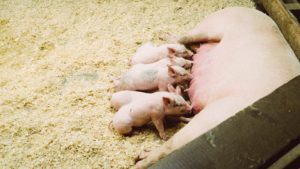
Photo by Greg Ortega on Unsplash
This also holds true for food producers. A small family farm hand raising meat with love, affection, attention, rotational grazing on healthy land and a good natural diet is a beautiful place. These people love their animals and the land. They also slaughter, butcher and eat their animals. They participate in, understand and respect every part of the cycle, from breeding to table.
To equate something like that with the nightmare of some modern mass meat production is simply ridiculous. If you want to see cruelty to animals, all you have to do is whisper “profit” into the ear of a corporation. Big Oil, the cosmetic industry and the fashion industry are just a short list of entities who have done plenty to destroy animals and habitat, and most people don’t care.
Incidentally, I’ve spent much of my life involved with animal rescue. I’m proud to say my mother is one of the most talented people I’ve ever met or heard of with animals and she’s largely given her life to making the world a better place for them, particularly horses and dogs, but by no means exclusively. This has all been volunteer work, done out of respect and love for the life in the world that can’t fight or speak for itself. She doesn’t see herself as better than. She sees herself as part of. The animals honor her with their presence and companionship, not the other way around.
So, yes, I eat meat with great enjoyment, AND yes, I love animals. I’m not limited by an inability to dwell in the sacred and powerful duality of life and death.
Bigger than all of this, however, is the guilt aspect, the real heart of this post. A vegan asks, “What do you do with your guilt about eating dead animals?”
For me, this question is much bigger than an issue of diet. The question reflects just how far we’ve strayed from wisdom, health and sanity in this culture.
When did we become amputated from our rightful place in the complex, miraculous web of life around us? What are the roots of the tragic and fatal arrogance that makes us believe we’re in control of life and death in our complex system? At what point did we become estranged from aging, loss, death and decay, which is to say HALF the full, powerful cycle of life?
Life is death. Death is life. Neither has meaning without the other. Both are essential. All life feeds on death. When we walk in the forest we’re walking on death. The whole natural world is based on prey and predator, eaten and eater. What does a tree do about its guilt as it feeds off and roots in the bodies of its companions? What does an eagle do with its guilt when it takes a salmon? What does a lion do with its guilt when it runs down a gazelle?
The guilt in that question is a projection. I don’t have any guilt about eating meat, and I think it’s tragic that anyone has guilt about the necessity to eat. If you pull up a carrot and eat it, you kill it. Every bite of food we put in our mouths is possible because of death. We exist as part of a vital, dynamic and inestimably beautiful and precious system that ebbs and flows, dances, fluctuates, cycles and revolves around life and death. We can choose to act as a unique and valuable part of that system by using only what we need, nurturing and learning from the life around us, and joyfully participating in all the ongoing life-death-life-death cycles around and within us, or we can choose to deny, destroy, and/or desperately try to control life and death, which is a completely fruitless (no pun intended) endeavor. We, thank God, are not that powerful.
The seasons will cycle. New life will be born in the midst of death. The green world will reseed itself, sprout, grow, bloom, fruit and die. The microscopic world and fungi will continue to break death into a rich placenta that sustains the next generation of life. Life is an incredible privilege. Death is part of that privilege. Nurturing life and allowing to die what must is part of what it means to me to be a woman.
I don’t know what’s going to happen to my country, the climate, or the planet. I’m afraid for us all, and the world we call home. What I do count on is the mighty cycle of life and death. All things change. All things move and flow. Nothing ever stays the same. All our fear and desperation, our greed and selfishness can’t change life and death.
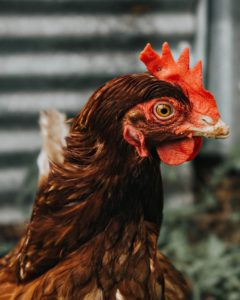
Photo by Andrea Tummons on Unsplash
What I can do is figure out how to best support my body with food. Then, I can make choices about how I procure the food I eat — to some degree. I don’t have the means right now to grow my own meat. However, I can and do buy eggs from a neighbor farmer, driving very carefully into the yard so as not to run over her free-range chickens and ducks. I can take the time to relish and appreciate opening a many-times recycled egg carton and looking at a whole variety of shaped, sized and colored eggs, mixed with occasional bits of straw and feather fluff. I can save money so I can buy a half an animal in the fall from a local small farmer to put in the freezer. I can buy fresh local yogurt, butter, cream and cheese from the farmer’s market.
It seems to me our energy should be going into making sure everyone has adequate food and clean water, and that we treat our food sources, whether animal or plant, and the system within which they grow (you know, the planet? Earth?) with love, intelligence and respect. We all can do something about food. Those among us who are doing the hard and unprofitable (financially) work of growing food on small farms may well hold the keys to our future survival. What they know about permaculture, holistic environments, food forests, sustainability, breeding, planting, harvesting and slaughtering is truly the wisdom of life.
Which is to say the wisdom of death.
Which is to say, again, the wisdom of life.
Bon appetit.
See the fourth post in this series here. Check my Resources page for links to information about diet and nutrition.
All content on this site ©2017
Jennifer Rose
except where otherwise noted
by Jenny Rose | Feb 2, 2017 | Contribution, Emotional Intelligence
This week’s post is suspended between two stories. The first one is the old Greek myth of Sisyphus.
Sisyphus was a crafty and deceitful king who craved complete power. In his pursuit of power, he offended many men and gods and was eventually punished by being sent to the underworld and forced to roll a huge boulder up a steep hill. The boulder was enchanted, however, to roll back down the hill (over Sisyphus, in some versions) just before it reached the top. Thus, Sisyphus was doomed to repeat the same unending and futile task forever.
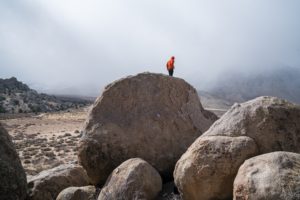
Photo by Tommy Lisbin on Unsplash
Sisyphus has captured the imagination of many writers, philosophers and artists, and there are several variations and interpretations of his story. If you’re interested, you can follow the link to to Wiki and read more.
Sisyphus is on my mind this week, not only because his story suggests to me the inevitability of rising and falling cycles, but also because his punishment was to forever try and fail.
His punishment was to forever try.
Huh.

Photo by Casey Horner on Unsplash
I’m a product of a culture that taught me certain core truths about life. One has a responsibility to help others. Everyone has to do things they don’t want to do. One must never give up. One must try one’s best. We’re all in a train behind a little engine that puffs, “I think I can, I think I can, I think I can,” and that’s the right place to be, the admirable, ethical, moral, adult, acceptable, responsible, side-of-the-angels place to be. Good people try and try and try. They don’t despair, they don’t give up and they don’t say it’s too hard, I can’t or, most unforgiveable of all — I won’t.
No is not an option.
The truth is one of the things I least like about myself is that I can always be counted on to try my best. I don’t mean work hard. I mean try hard. Trying is certainly hard work. It’s sucked up most of my life in terms of time and energy. A lifetime of trying, though, has produced less of value to me, and I suspect to others, than an hour of work at writing, dancing, gardening, making love, playing with a child or even scrubbing the kitchen floor.
In the last ten days, I’ve been living right alongside Sisyphus. In the last ten days, I’ve meticulously gone through headlines, articles, links, petitions, news and requests for action in my email, not once but two or three times a day, because I want to help. I want to do something that matters. I want to make a difference. In the last ten days, I’ve intentionally and consciously been present, engaged, interactive, interested in what my partner is thinking and talking about, which has been largely political news, because I want to be a good partner. I want to demonstrate I’m brave and strong and intelligent enough to be part of the conversation going on in the world.
In the last ten days, I’ve privately and quietly despaired, lost sleep, felt inadequate, lost my center, lost my peace, felt gnawing anxiety and been deeply ashamed of who I am.
I’ve tried so hard.
I’ve failed so hard.
It’s not working. I can’t live like this. I’ve been pushing that rock up the hill as bravely as I can, but it just keeps rolling back down. I’m exhausted, bruised, battered, my fingernails are torn and I’m quickly losing any desire to be engaged with life.
However, oddly, one thing is working.
A couple of weeks ago, I went to a self-defense class at a local community center. The activities director happened to be there, and on an impulse I introduced myself and asked him if he’d be interested in working with me to start a community dance group. We fell into conversation, one thing led to another and as I write this, advertising is in process, flyers are getting printed, and somehow, I’m scheduled to start up a dance group in March, a thing I’ve long wanted to do in order the create the kind of healthy, inclusive community I’m starving for.
I didn’t try at all. It just kind of happened and I went along for the ride. I’ve spent hours and hours building dance playlists, but that wasn’t trying. I wanted to do it. I loved doing it. Music instead of current news? Lead me to it!
So what is it with this trying thing that’s driven so much of my life? I can’t remember a single time trying hard resulted in an outcome I wanted. It seems to me whatever happens, happens. Things always and inevitably turn out the way they turn out. I may have occasionally bought some time. I may have kept things glued together with my frantic trying longer than they would have otherwise, but was that a good thing, or in the end did I just make the cost higher for myself and everyone else?
All the really good things I can remember in my life just happened. I didn’t plot, plan, manipulate, force or otherwise try. I was simply living my life.
And what about the punishment piece? Sisyphus, by all accounts, was not a nice man, and I don’t waste much pity on him, but what about me? Endless, futile trying certainly feels like a punishment. Why have I always accepted that? Why haven’t I been able to choose to stop?
The truth is I try so hard because I feel like I have to make up for what a difficult, noncompliant, hypersensitive, disappointing, needy, dramatic, sensual person I am. I know I’ll never please or get it right, so all I have is knowing I tried as hard as I could. The world is filled with talented, creative, loving, generous, kind people. They don’t have to try to make the world a better place. The world is a better place because they live in it.
I’m not like them. I’m broken.
It’s not like I can just not try to make up for being broken!
If I don’t try, then what is there?
Which leads me to the second story, which I can’t find this morning, but I know is here somewhere in my library!
A student approached the master and said, “I work with disabled children and their families. Master, there’s so much difficulty for these people! I want to help, to make things better for them! What should I do? How can I best relieve their suffering?”
The master replied, “With no thought of help.”

Photo by Stephen Leonardi on Unsplash
All content on this site ©2017
Jennifer Rose
except where otherwise noted
by Jenny Rose | Jan 19, 2017 | A Flourishing Woman, Self-Love
I went to a self-defense class last weekend, and it changed everything.
I’ve been thinking about self-defense a lot lately. In the past month or two I came across a book by Kelly McCann titled Combatives For Street Survival, illustrated throughout with photographs. That book opened up a whole new world to me. Not only is McCann direct and clear, he has a no-bullshit approach to the techniques and skills of self-defense. He knows what he’s talking about, as he’s an ex-Marine and has a wide variety of experience all over the world. He’s not interested in ideology. The only thing he’s interested in is what works to discourage or disable (note I did NOT say kill) an attacker, and he makes the point, over and over again, that if you’re forced into a fight in spite of good situational awareness and avoidance tactics (preferably running like a rabbit), you’re more likely to live if you learn a small set of flexible techniques and practice them.
What struck me most forcibly about McCann’s book was it represents permission to defend oneself. No one ever gave me that before. On the contrary, it seems to me all I’ve ever learned is that self-defense is not allowed. Self-defense is disloyal, a betrayal, dramatic, hysterical, disobedient, shameful, disruptive and makes others uncomfortable. For God’s sake, don’t make a scene!
I think a lot about boundaries. Self-defense is maintenance of boundaries. So, according to what I’ve learned in the world, maintaining boundaries is inappropriate. In fact, self-defense is violence, an act of aggression.
This is complete nonsense. Self-defense is not offense. Self-defense doesn’t come first. Self-defense is a response to threat or violence. Self-defense is not entering a building with guns blazing. It’s not swaggering down the street picking fights. It’s not bullying, machismo, unprovoked hostility or aggression. Self-defense is not a power grab.
Self-defense is a willingness to protect a boundary. It’s the right to say yes or no. The point is not whether others respond to or respect our boundaries (although that would be nice). The point is not whether others come to our assistance when we’re under attack. The point is we have a right to protect ourselves.
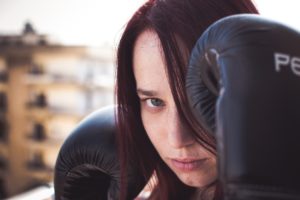
Photo by Jason Blackeye on Unsplash
So, with all these thoughts jostling around in my head, I went to a free self-defense class at the local community center.
The class consisted of about fifteen women, age range high school to 50s. The instructor was a local martial arts teacher and he had female and male students with him to assist. It was a three-hour class.
Two things happened there that I’ll never forget.
The first was learning how to punch. This is not a thing I’ve ever wanted to learn. I don’t have much upper body strength, I know it’s easy to break your hand punching people or things, and I’ve no desire to punch anyone, ever. However, it was part of the class, so I learned. Then the instructor and male assistants filtered through the class, coming to each of us and asking us to punch them in the abdomen.
A large young man, over six feet tall, solid, strong, with hair dyed strawberry red, came and stood toe to toe with me, grinned, and said, “Hit me.”
I looked up into his face. “I don’t want to do this.” (Variations of this statement could be heard all over the room.)
“Go ahead. You won’t hurt me.”
This, I reflected, was probably true. Even if I’d known how to punch, I doubt I could have really hurt him. That wasn’t the thing holding me back.
I was being asked to deliberately, in cold blood, hit a nice young man who might have been my sons’ age or even younger, a stranger, in the stomach with my fist.
In that moment, I began to see the enormity of the disempowerment of women around self-defense and boundaries.

Photo by James Pond on Unsplash
I said to him, “I’ve been hit before, but I’ve never hit anyone else.”
His face darkened. “Then here’s your chance.”
“But it wasn’t you!” I said, on the edge of tears.
He stood there, waiting. I doubled up my fist and hit him.
“Again,” he said.
I did it again.
“Harder! Put your shoulder into it!”
I did it harder. Not as hard as I could, but harder.
“Good.” He stepped in front of the woman next to me.
This was happening all over the room. I saw women in tears. I saw women “hitting” with force that wouldn’t have knocked over a kitten and then apologizing abjectly. Eventually, with a lot of coaxing, most of us tried with at least moderate strength at least once. This single exercise took a large chunk of the total class time and was the hardest part of the whole class for me.
We knew, at the end of the class, there would be an opportunity to role play with one of the assistants or the instructor and demonstrate some of the techniques we’d learned. The instructor spent a lot of time talking to us about situational awareness, body language and the psychology of violent attack, and emphasized making noise in order to create an audience and discourage an attacker. He gave us language to use (WHAT DO YOU WANT?), and demonstrated. It was very clear, and the easiest part of the training — no new moves needed.
When it came time to role play, the instructor asked for volunteers. The nervousness in the room was palpable. Nobody wanted to do it, though there was an agreed upon safe word that would immediately end the role play and the situation was completely contained and controlled.
This is not the sort of thing that intimidates me, so I volunteered first and chose as my attacker the strawberry-haired gentlemen who so kindly encouraged me to hit him! Everyone laughed at this, because he was the biggest assailant I could have chosen. He was very pleased. He’d thought no one would pick him for this part of the class.
I strolled along in the middle of the classroom and he came up behind me and grabbed my shoulder. I turned around and asked him, loudly and aggressively, “WHAT DO YOU WANT?”
He grinned and transferred his grip to my upper arm.
I faced him, got my hands up and yelled into his face, “BACK OFF!”
It wasn’t him I was yelling at, though. It was a whole crowd of other faces, both male and female, people who have hurt me with fists and words, people who have shut me down, shut me up and taught me to be small and silent. I felt like a snarling wolf, a cornered tiger. With those two words, I reclaimed my willingness to self-protect and the power to do so.
I surprised him. He flinched back a little and his grip loosened. The instructor wanted the role play to continue until he felt that each woman had done something that gave her a chance to run. In less than a minute I was back against the wall with the rest of the audience.
One by one, with a lot of encouragement, every woman got up and tried the role play.
Not a single woman was able to use more than a moderately loud voice or any kind of an aggressive tone. They sounded terrified. They sounded weak. Their tone of voice was begging and pleading. The ones who did manage a puny blow or an evasive maneuver apologized to their pseudo attacker even as the attack continued. The instructor prompted, over and over again, “Louder! Shout out! Let us hear you!”
They couldn’t do it. Some even said, “I can’t!”
This assortment of ordinary women with a wide span of ages couldn’t be verbally aggressive with an attacker, even though they had full permission, were encouraged, supported, totally safe, and had my example paving the way.
Are you understanding this? These women couldn’t defend themselves, even verbally. All the guns and knives and skills in the world wouldn’t have helped them.
It boggled my mind.
Ever since that day I’ve been thinking about the power I felt when I yelled, “Back off!”
Ever since that day I’ve been thinking about a culture that silences, shames and disempowers women to the point that so many are unable to protect themselves.
Ever since that day I’ve reclaimed the right to defend myself.

Photo by Timothy Eberly on Unsplash
All content on this site ©2017
Jennifer Rose
except where otherwise noted
by Jenny Rose | Dec 1, 2016 | Connection & Community, Emotional Intelligence, Shadows
Tribal shaming is one of the most powerful ideas I’ve been introduced to in the last years. A friend sent me a Facebook post by the author Elizabeth Gilbert (author of Eat, Pray, Love). Here’s a link to that post. You don’t need to be on Facebook to read it, just press “Not Now” when it asks you to sign in.
It’s a long post, but it’s also life changing. Get ready for insight and clarity you’ve never had before about your tribe on every level, from family to country.
In (very) short, the concept comes from Dr. Mario Martinez, who wrote a book called The Mind-Body Code. Gilbert provides a link to a podcast by Dr. Martinez in her post. Gilbert was so stunned by Dr. Martinez’s work that she posted about it, and now her post is all over the net. Clearly, others find it as significant as I do. As the political situation unfolds day by day here in America and all kinds of people react in all kinds of ways, I keep thinking about the power of tribal shaming.
In this context, the word “tribe” means any group with which we identify. Tribe is family, church, community, culture, nationality, team, workplace, etc. Tribal shaming examines the power of the tribe. It’s not a new idea, of course. We’ve studied cults, gangs, religious sects — all kinds of groups — in order to understand the choices we make and how they’re influenced by those around us. What I hadn’t thought about before was the invisible destructive power our tribe(s) have over our ability to live well.

Photo by Liane Metzler on Unsplash
One of the greatest motivators for us as humans is the desire for connection to others. Our earliest experience of connection takes place in our family of origin, or in the context of whoever raised us, even if just people in an institution. From infancy on, we’re each surrounded by tribal cultures and norms, tribal rules, and the differentiation of our tribe from others. This shows up in an overwhelming number of ways: Economically, geographically, religiously, educationally, etc.
Tribes provide us with connection, identity, meaning, and, hopefully, security and safety. They help us define ourselves and shelter us from an unkind world. Connection is a deep need for human beings, and without it we don’t survive. We know there are all kinds of consequences for people who have no early sense of tribe, from attachment disorder to failure to thrive to severe mental illness — and those only if the child survives in the first place.
Tribal connection works very well for people who feel they belong in the tribe(s) in which they find themselves.
But what happens when we don’t fit into our tribe? What happens when we ask questions and break rules? What happens when we don’t accept the tribe’s authority? What happens when the tribe abuses us?
Tribal shaming, that’s what.
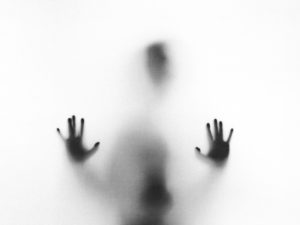
Photo by Stefano Pollio on Unsplash
Now, you might say, so what? So you break away from your family, group, church, whatever. Big deal. People do it all the time. It doesn’t matter.
That’s true. It’s also true that at a casual glance we’re all just fine. We move, we change jobs, our beliefs and views change, we get divorced, people come and go out of our lives. We spend time on social media, catch a movie, watch TV, have a drink, take a pill, buy a pint of ice cream, light up another cigarette. Maybe those closest to us see a shadow of addiction, workaholism, people pleasing, depression, insomnia and anxiety, but that’s nothing, right?
I don’t believe that for a single second.

Photo by Joshua Earle on Unsplash
It does matter. Tribal estrangement is a deep wound that never stops bleeding, and it doesn’t much matter why the estrangement exists. If we feel cast out from our tribe, it hurts. We may grieve, we may rage, we may become ill, but there will be consequences for this kind of amputation. One hundred friends on Facebook can’t make up for it.
It hurts so much, in fact, that many of us self-sabotage so we can go back, because the thing about tribe is they’ll always take you back if you fail. Now think about this for a minute. You can always go back if you fail.
The power of tribal shaming touches us all. I’ve seen it play out very powerfully in my family, and I bet you have, too. Right now, huge populations of people are on the move in the world, compelled by war, politics and the basic necessities of food and water. Millions more will be displaced by climate change. Social, geographic and economic boundaries are threatened. Our sense of self and tribe is undergoing intense pressure as we fight for space and resource.
Through this blog, I’ve made a friend in Nigeria. Her experience as a woman in a large city in a foreign (to me) country is eye opening. It’s easy to forget how life is for many other people in many other places. Today we might be able to eat, have a job, or have a roof over our head. Today we might have a tribe, no matter how small, or maybe several tribes give us a sense of belonging and comfort, but tomorrow is another day, and much of the world is closer than we are to the precipice of famine and chaos.
The concept of tribe, like the concept of resource, is fluid. We define it ourselves. Right now in America, we’ve made money the most important resource. What will happen when a cup of clean water or a mouthful of food becomes the only resource that counts? What will happen if tribal shaming becomes tribal sharing and we decide to create a tribe of all life on earth, including the planet itself?
In the meantime, though, we clearly feel it’s effective to create small, rigidly defended tribes with small, rigidly defended rule sets and spend time making bombs of all kinds to throw over our palisades. Whatever happens, we must not allow the threats of education, science, literacy, critical thinking, equality or any kind of difference to exist. People must toe the line or get out — one way or the other.
Us against them and the outcasts in between. It works so well, doesn’t it?
All content on this site ©2016
Jennifer Rose
except where otherwise noted
by Jenny Rose | Nov 17, 2016 | Connection & Community, Emotional Intelligence
I haven’t enjoyed this week much. It reminds me of the week after 09/11, when I thought I would drown in the hate and despair around me.

Photo by Quino Al on Unsplash
I’m not on Facebook, but my partner is and I hear more than I want to about what’s going on there. I’m developing a pathological hatred of the news in any form, even as I obsessively read the Internet. I think about friends, family, acquaintances and a world full of frightening strangers with the power, strength and willingness to hurt others, including me.
I work at home as a medical transcriptionist, a fact I don’t talk about much because I respect the privacy laws in this country around medical information. My book of business is presently in Illinois, but I’ve also worked extensively in New York, Ohio and Alabama. I spend twenty-four hours a week typing dictated stories about strangers, a significant number of them experiencing physical and emotional pain and suffering from the current situation.
Here in central rural Maine, Native Americans in our community are victims of increasing hate crimes. Their people have been in this place for thousands of years.

Photo by Sue Tucker on Unsplash
It seems to me in the last week we’ve put on the table an infinite number of ways in which to divide ourselves from one another; an infinite number of ways to express hate, intolerance and blame; an infinite number of labels to weigh ourselves and others down with. None of it feels useful
I want to find ways to support what I believe in and reach out to other people. I want to do something, no matter how small, to make a difference in this, but I’m noticing something interesting about that. As soon as I communicate about some kind of action I’ve taken, someone cuts me down. I’ve been told wearing a safety pin is patronizing and indicates privilege; I’m not welcome in America; I’m going to burn in hell; and I’ve joined a hate organization (that would be MoveOn.org).
Maybe no one out there needs support, or wants to make a contribution to unity and respect, but I don’t really believe that. At any rate, I need support and I do want to make a contribution, so here are some thoughts about what would help me.
Here’s a graphic to contemplate as we go on:
Enough with the labels. We have to stop this. One thousand labels can’t define the complex creature a human being is. I maintain that what’s happening now is NOT about race, gender, religion, politics, immigration or socioeconomics. What’s happening now is about power — how we define it and understand it, how we use it and what we’ll do to gain it or overthrow it. I think the most important question to ask ourselves is if we support power-over others or power-with others. That’s really the bottom line. It’s at the heart of all the disagreements. The rest is just inflammatory and dangerous distraction.
Enough with the apocalyptic stories and predictions. The fact is nobody knows what’s going to happen now. We’re in uncharted territory politically, economically, socially and environmentally. Many people think that’s a good thing. Sure, it’s scary. The unknown always is. On the other hand, politics as usual wasn’t working very well for most of us in this country and change is an inevitable part of life. Blessing or disaster, the point is none of us know the future and we’ll all have to deal with whatever happens as best we can. Terrifying ourselves and one another with dire predictions, threats and stories won’t help anyone. Fear is terribly contagious and terribly ineffective in decision making, but it’s a useful tool for manipulation.
The best defense against fear and misinformation is to do our own research. All the people in the headlines right now are real people. They have lives, histories, Wiki pages, on-line organizations, quotes and podcasts. We can read about them. We can look at quality news organizations in other countries and what they’re reporting for a contrast to domestic news. Discerning between fact and opinion is important. We need to take responsibility for our opinions and beliefs.
It’s time to stop worrying about everyone else and clean up our own acts. Are our words and actions congruent? What do we believe, and why? What are our priorities? What kind of outcomes do we want for ourselves and our communities, however we define community?
We can’t change other people; attempts at doing so merely divide us more deeply. We must accept that not everyone agrees with us and stop wasting time in destructive argument. We don’t have to shoot one another in the head and throw scorn at those who disagree with us. We can use our energy to work for what we believe in and allow others to do the same.
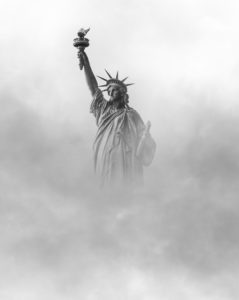
Photo by tom coe on Unsplash
We don’t have to accept an invitation to fight. We can find communities in which respectful conversation and debate take place if we want to discuss an issue. Many of us don’t feel safe verbalizing, revealing or defending our views, but everyone can vote with their presence. If we’re uncomfortable or scared in a conversation, we can leave it. We can’t stop hatred, but we don’t have to be a part of it.
We can learn to express our thoughts, feelings and opinions in a way that allows others respect and dignity. We can learn to listen. We may disagree with people, but that doesn’t mean they have nothing important to say.
We need to root out sweeping generalizations. All white people are not living a life of economic privilege! All patriots are not Christians! All Muslims are not terrorists! All blacks are not criminals! All Latinos are not undocumented immigrants! All men are not rapists! All gay people are not child molesters! All Christians are not militants! First graders think in these black and white ways, not adults. We shackle each other with these assumptions.
There’s a lot of talk about privilege right now. It’s a slippery term, and I think the perception of privilege is really in the eye of the beholder. Here’s a very interesting self-test you can take. Some of the questions will help you appreciate the difficulties many people face. In case any one wonders, my score was a 44 — NOT privileged, according to this tool. Certainly very privileged in comparison to some people.
Going on from here. My daily crime.
All content on this site ©2016
Jennifer Rose
except where otherwise noted















